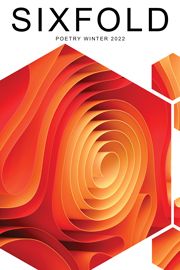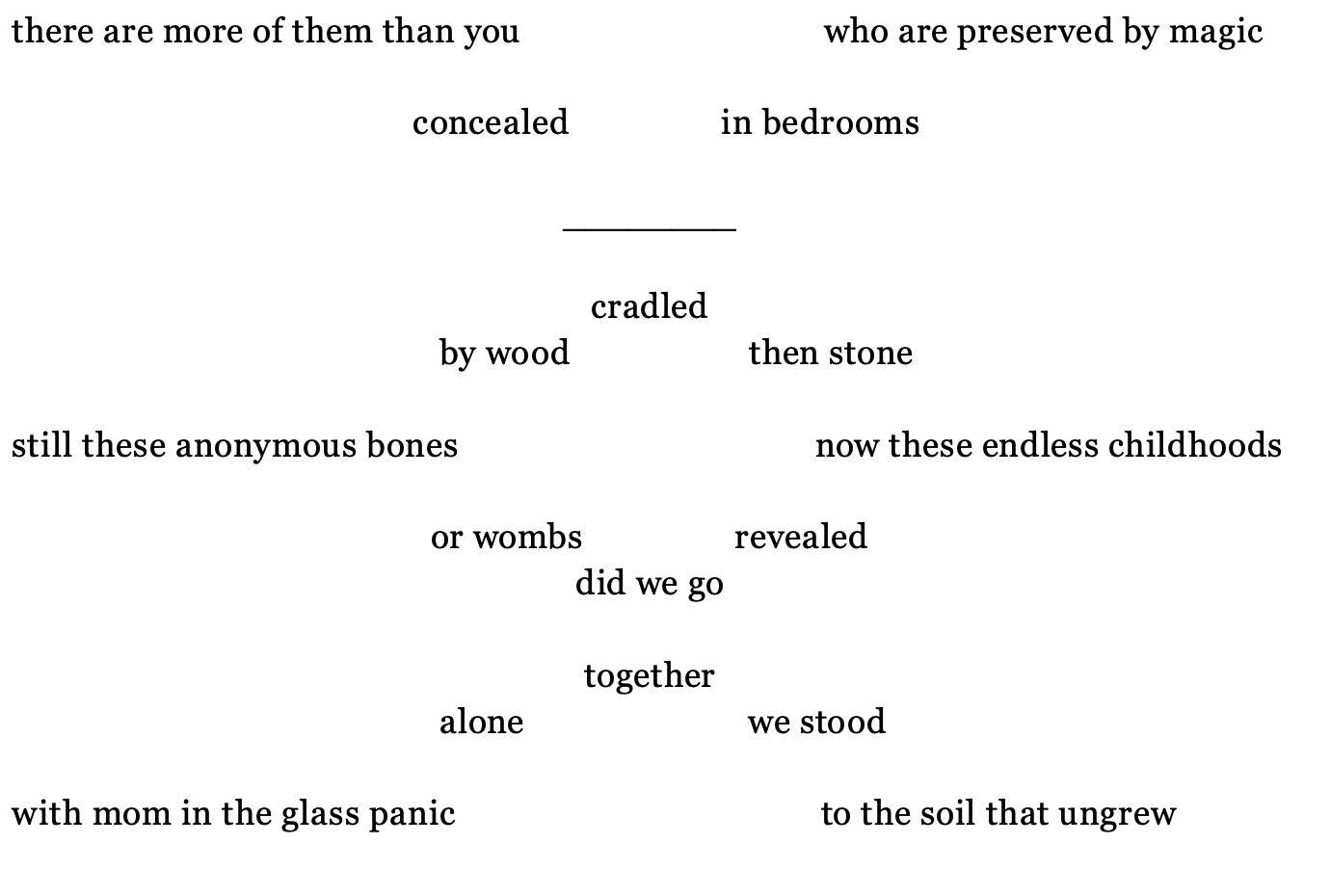
Poetry Winter 2022 fiction all issues

whitespacefiller
Cover
Li Zhang
Ana Reisens
Pam asked about Europe
& other poems
Krystle May Statler
To the Slow Burn
& other poems
Kristina Cecka
On Remodeling
& other poems
Belinda Roddie
Bless The Bones Of California
& other poems
Summer Rand
Alexander tells me how he'd like to be buried
& other poems
Alexander Perez
Toward the Rainbow
& other poems
Karo Ska
self-portrait of compassion…
& other poems
David Southward
The Pelican
& other poems
George Longenecker
Stamp Collection
& other poems
Mary Keating
Salty
& other poems
Talya Jankovits
Imagine A World Without Raging Hormones
& other poems
Laurie Holding
Sonnet to Mr. Frost
& other poems
David Ruekberg
A Short Essay on Love
& other poems
Elaine Greenwood
There’s a thick, quiet Angel
& other poems
Richard Baldo
Carry On Caretaker
& other poems
Jefferson Singer
Dave Righetti’s No-Hitter…
& other poems
Diane Ayer
A Fan
& other poems
Kaecey McCormick
Meditation Before Desert Monsoon
& other poems
Meg Whelan
Resubstantiation
& other poems
Katherine B. Arthaud
Possible
& other poems
Aaron Glover
On Transformation
& other poems
Anne Marie Wells
[I'm crying in a sandwich shop reading Diane Seuss' sonnets]
& other poems
Holly Cian
Untitled
& other poems
Kimberly Russo
Selective Memories are the Only Gift of Dementia
& other poems
Steven Monte
Larkin
& other poems
Mervyn Seivwright
Fear Mountain
& other poems
Meg Whelan
Resubstantiation
I was happy to feel that blood.
I knew it was here, swollen and warm,
the way I knew it was there, drying,
when they called to say he was missing
with a gun
Could you please try calling him?
Yesterday’s ache of growing Texas martyrs
became pain that pulsed
and gripped the steering wheel when
I braked long enough to feel
Thank God
I’m not pregnant
in Kentucky
I can’t get a hold of him.
The one degree of separation that kept their hands clean
I’ll press between their palms
like a prayer stone
with the sharp end facing bone and staring through
skin with a scream
They’re looking.
I hope their veins stigmatic stream
until the pools drown each gesture in the lives
of those they took
I hope their fingerprints last
and that their legacy
sinks them deep
So when my thumb is gripped by a little hand,
instead of this welcomed red,
her body is proof of a reckoning
until we send her to school
I’m sorry.
Cocoon
The first who arrived on line twelve, her in the fur and him in the black,
both with socks which suited shoes that belonged on streets,
arms across one plastic seat
and in kerchiefed pockets as he stood,
not even a nod the stop, eyes ahead and past the glass.
At dinner, there were just two wings—orange oozing to a blur—circling
around the three below. I figured that the butterfly had arrived
with the front yard’s fresh daffodil patch. And that it had snagged
adventure in the whirl of the ac unit. I watched on the other side.
And then him, with crutches, and her
with chestnut hair holding her hips,
who smiled to pull in close,
like the three-quarters mark of a movie,
and she left, flicking the door open, not seeing
if he fluorescent followed behind.
After my walk, the two became six. I poured a glass to drink. Now,
eight? Ten? Like water in hot oil, the frenzy pumped their bodies into
and against and with the cyclone. They were at the whim of seventy-
one degrees.
Now them, who let masks hang and chair fling upright
to press into each other, him petting the bridge of her nose,
her checking their reflection in the smudged poster beside my head,
as a shove hurdled them into the next.
The sun set, the house cooled, and the thermostat stopped. And the
breeze-climbing couples made a dash into the fiery shadows of dusked
trees. I watched them quiver in the pine limbs until night turned the
window into a mirrored face.
And metal released from our embrace,
and I danced down the hill because my body said so,
elbow pushing through evening winter air, inviting
fingers to a sweet flourish at the peak,
falling again as my feet told me to turn.
She takes her bow. And becomes my home.
Pennebaker said that if you write, you go to the doctor less // Water is healing
I bet those sideways scribbles were like morning’s first faucet sip.
We didn’t think to need it, but it sure did feel good
when the pen straddled nubby fingertips and puffy palms
like a colander balanced between big pot and frying pan.
It’s important to stay hydrated.
She placed me at the afterdinner table with marker and laminated alphabet
like a mutt pup thrown to the lake because he surely knows how to swim.
His flails and gasps breed confidence after his bones teach him how.
Mom was glad the ink wiped away dry.
But still, she warned the kindergarten that I’d taught myself and that I
was proud. And from his tank beside the bookshelf,
the box turtle slammed against the glass. The splash held my gaze
while I dazed at dotted lines and trained fingers for form.
The cartons of the journals downstairs in the hot water closet.
Pound for pound, how many of them would represent surgeries unstarted, scars unslit, organs unautomized, molecules unmitigated?
If he had just written rather than sinew-strain, how far could he have been saved?
If he had told us earlier, if he could, would my text box sit alongside his buried one?
At what point across the ocean does a keyboard activate?
And what happened, then, when a few fell out drunk
in a room of a million languages?
What good did it do?
Your body is 70% water.
Why’d you like the mummies?
For “woman (35-49 years)” and “young . . . dynasty”
at the British Museum.

Romantic
We called that pretty, and it stopped them,
but shaken centimes in cardboard cups couldn’t.
Pink puffs of cotton candy cloud
painted in backward portraits while
the real thing brewed over cigarette butt huts,
and I walked down it while the brush
stopped to ask quelle heure est-il,
but the concrete drying kept me from
translating, so I showed her the phone
which, in English, showed me as I was,
and my lover’s hand who held his own
sunset zinnia which I gripped in palms
that were freshly picked by paranoia.
You displace what’s
in front of you
to see less clearly.
Meg Whelan is a Kentucky writer and teacher living in Paris, France. Her friends describe her as someone who “treats life like a university class.” Her poetry focuses on themes of embodied grief and shared memory. You’ll probably find her reading in the corner of a metro car, dancing on upward moving escalators, or frantically scribbling down other people’s life events in her calendar.
is a Kentucky writer and teacher living in Paris, France. Her friends describe her as someone who “treats life like a university class.” Her poetry focuses on themes of embodied grief and shared memory. You’ll probably find her reading in the corner of a metro car, dancing on upward moving escalators, or frantically scribbling down other people’s life events in her calendar.